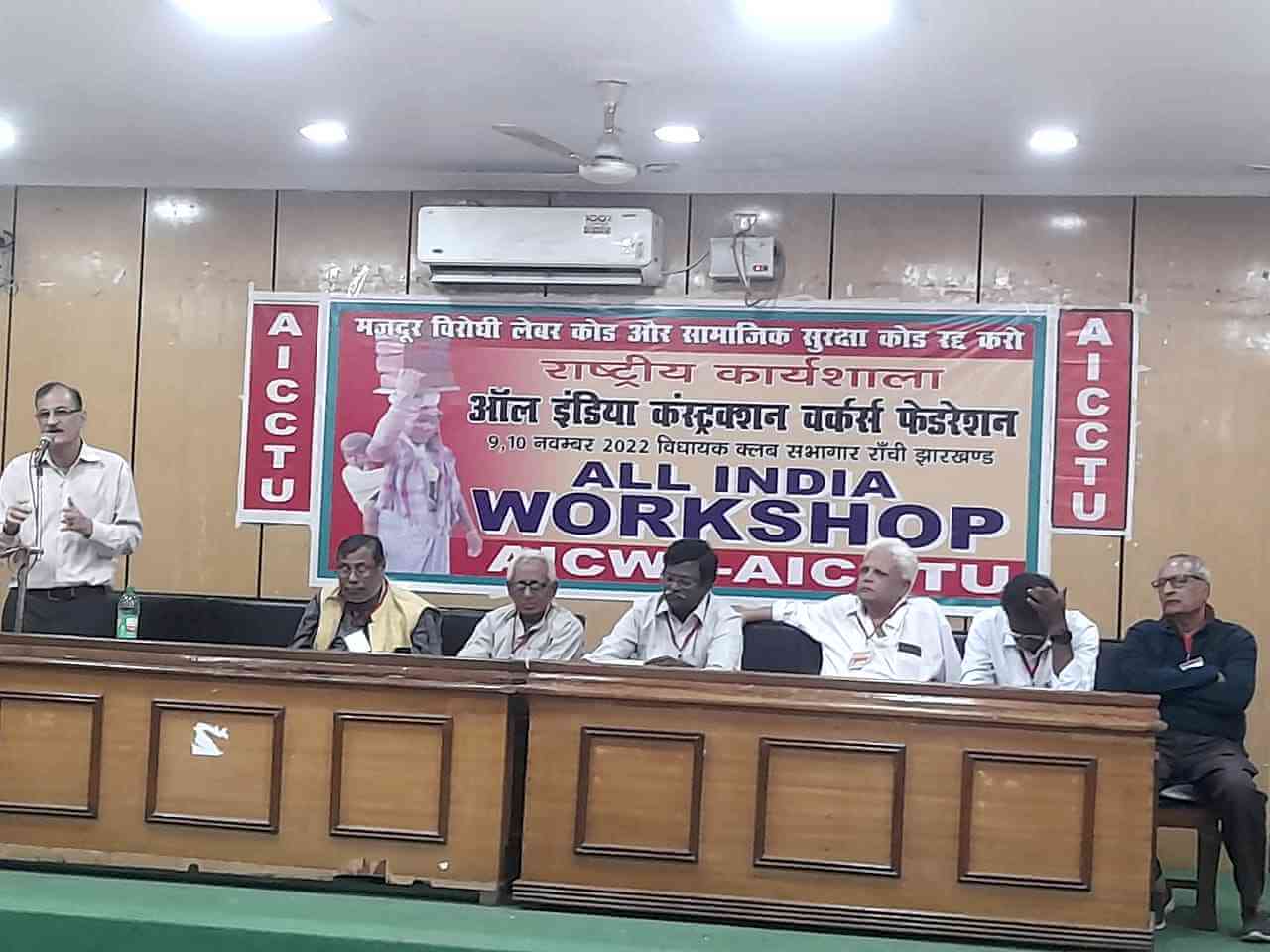All India Workshop of Construction Workers

All India Construction Workers Federation (AICWF) held its first ever all India workshop at Ranchi on 9–10 Nov 2022 in the backdrop of the Modi led BJP government’s attacks on the working class, including Labour Codes, dismantling of welfare boards and by taking stock of its experience since its inception.
Inaugurating the workshop, Comrade Rajiv Dimri, the General Secretary of AICCTU, said that the Codes Act, being imposed by the Modi government will soon replace the "Building and Other Construction Workers (Regulation of Employment and Conditions of Service) Act 1996". The repealing of this act will lead to closure of all 36 states BOCW Boards. In fact, the Code on Social Security is a direct blow on the building workers. He called upon workers to organise construction workers in large numbers to fight out the Modi government and its anti-worker policies.
Around 65 cadres from Bihar, West Bengal, Orissa, Andhra Pradesh, Tamil Nadu, Karnataka, Puducherry, Uttar Pradesh, Rajasthan and Delhi participated in the workshop. Changing composition and challenges of construction workers movement, changing laws and the newer issues and politicisation of the construction labour movement were the three major topics. Comrades SK Sharma, the General Secretary of the federation, Balasubramanian, the president and Comrade Shankar, AICCTU president were the resource persons while comrade RN Thakur introduced the subjects.
Construction workers constitute a single largest contingent of workforce, next only to agriculture, in the country. But, they are the most neglected lot without any real legal protection. They work without any job security, wage security and social security. Longer working hours without any overtime payment, casual nature of employment, etc., affect them very badly. They often fall prey to occupational diseases. In the absence of any safety precautions, the number of workers who lost their lives while on service is countless. In such cases, unfortunately, neither the building owner, nor the builder – contractors are made responsible for their lives. Workers are forced to mend for themselves.
There are endless categories of construction workers in terms of their trade or profession. They are generally organised based on labour corners or localities. Their plight should also be understood through their employment and workplace in order to formulate the strategy to organise them. Workers employed in government owned infrastructure projects such as construction of dams, roads, etc, workers engaged in private owned larger projects, workers engaged in quarries and brick kilns, workers engaged in emerging industries like readymix concrete manufacturing, migrant workers, workers employed in small scale construction activities and wage earners like electricians, plumbers, etc were identified as major sections of the construction workforce. There are several other categories of construction workers as well.
Some Major Changes in Laws
The paper on existing laws, Codes and implications for construction workers was presented by Comrade Balasubramanian. The Code on Social Security contemplates formation of a single welfare board at state level for all categories of unorganised workers by dismantling several boards that exist now. Its welfare functions are being restricted to the lowest. The provision of mandatorily providing basic amenities and rest rooms is completely relaxed and is almost left to the whims and fancies of the employers.
A construction worker was basically defined by their nature of employment. Now, The construction activities worth less than 50 lakhs are exempted from the definition of “Building and Construction Work” and thus workers employed in such projects are denied application of relevant laws. In addition, a threshold of 10 and 20 numbers are introduced for application of labour laws. For example, workers are entitled to ESI only if more than 10 workers are employed and are entitled to PF only if more than 20 workers are employed. With these changed definitions, a vast majority of construction workers are removed from the purview of labour laws. Only a worker engaged in a project that employed more than 10 workers in the previous 12 months will be considered to be a construction worker, according to the Labour Codes. This change in definition is a major blow to workers.
Some Aspects of Construction Workers’ Unionisation
Comrade Shankar emphasised on the need to struggle for the expansion of welfare benefits; to organise against the nexus of real estate mafia, bureaucrats, builders and contractors; to hold the owners of the construction, builders and contractors responsible for any death or disablement while on duty and also for the welfare; and to organise struggles of construction workers against the policies of the central and state governments, for decent wages, improvement in living standards, better working conditions, proper housing and for the dignity of workers. He also pointed out a greater need to integrate the construction workers movement with the struggles of migrant workers and all other workers in urban areas.
He called for an intense and widespread campaign against saffron fascism and against the Modi government that is snatching away all rights of construction workers and to defeat the BJP in 2024 General Elections.
Comrade Subhendu Sen, the general secretary of AICCTU, Jharkhand, also addressed the workshop.
Charu Bhawan, U-90, Shakarpur, Delhi 110092
Phone: +91-11-42785864 | +91 9717274961 E-mail: info@cpiml.org

